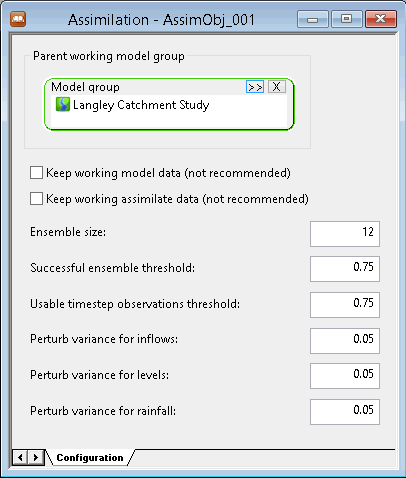Assimilation Dialog
This dialog is displayed by right-clicking on an assimilation object in the tree view of the Explorer Window, and is used to define the parameters for an assimilation operation.
This options in this dialog are described in the following table:
|
Item |
Description |
|---|---|
| Parent working model group |
The name of the model group. This group will store all the runs required for assimilation. The model group can be selected using one of the following methods:
|
| Keep working model data |
A check in this box indicates that model data, which is created temporarily during the assimilation operation, is to be kept. A temporary model group, which contains the temporary runs, is created within the specified Parent working model group. If you do not want to keep the data (recommended), then ensure that this box is unchecked (default). The temporary data will be automatically deleted at the end of the assimilation operation. |
| Keep working assimilate data |
A check in this box indicates that all the files associated with assimilation are to be kept and stored in the local agent job working folder (usually %ProgData%Innovyze/InfoWorksAgent/<Job-GUID> ) This is only likely to be used at the direction of the Innovyze Support Team. If you do not want to keep the data (recommended), then ensure that this box is unchecked (default). The temporary files will be automatically deleted at the end of the assimilation operation. |
| Ensemble size |
The number of times the boundary condition data is initially perturbed. The minimum is 2, maximum is 999 and the default is 12. |
| Successful ensemble threshold |
The threshold, expressed as a decimal percentage, of ensemble jobs that must succeed, or succeed with warnings, in order to generate a set of assimilation results. The minimum is 0.05, the maximum is 1.0, and the default is 0.75. |
| Usable timestep observations threshold |
The threshold, expressed as a decimal percentage, that determines if the assimilation job is to proceed (with warnings) when some timesteps are missing from the TSDB observations. The minimum is 0.004, the maximum is 1.0, and the default is 0.75. |
| Perturb variance for inflows |
The value used in the perturb telemetry calculation that represents the inflow boundary condition variance. The minimum is 0, maximum is 999 and the default is 0.05. |
| Perturb variance for levels |
The value used in the perturb telemetry calculation that represents the levels boundary condition variance. The minimum is 0, maximum is 999 and the default is 0.05. |
| Perturb variance for rainfall |
The value used in the perturb telemetry calculation that represents the rainfall boundary condition variance. The minimum is 0, maximum is 999 and the default is 0.05. |
See Assimilate the State of a Model for information about how to use this dialog.

 button, select a model group from the displayed tree and click
button, select a model group from the displayed tree and click 